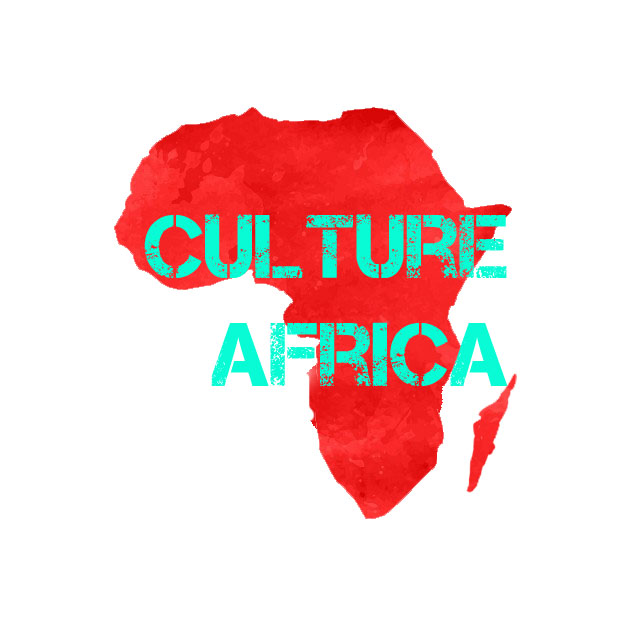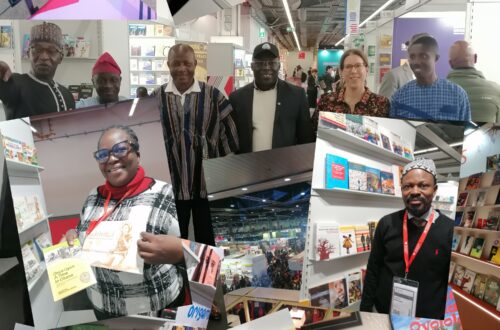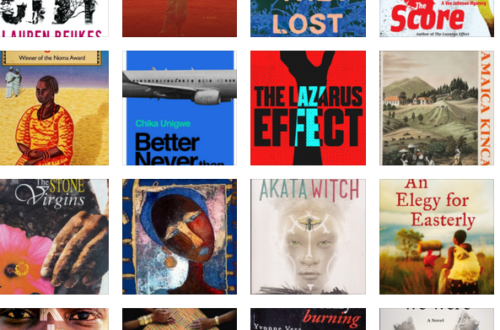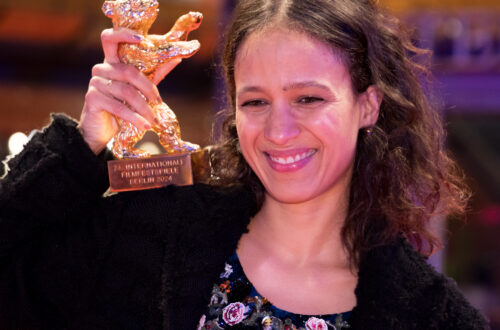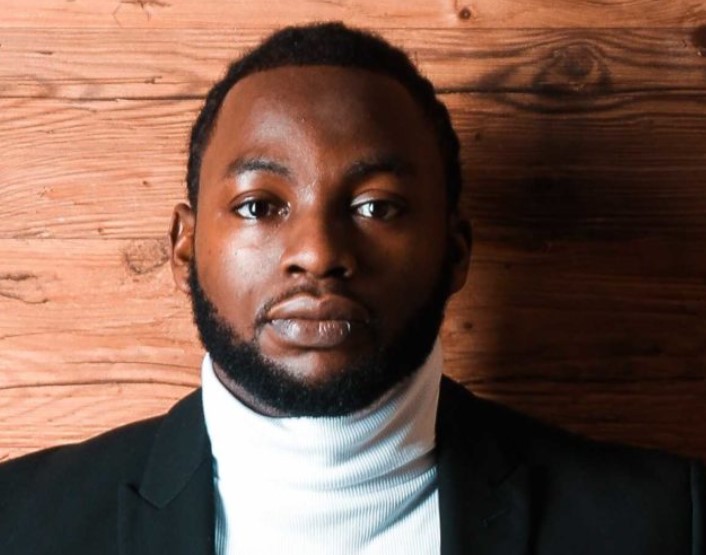
“It can’t just be about technology. Much more needs to be changed, especially the mindset.” 3Es4Africa: Interview with Contimi Kenfack Mouafo ger/engl
Education-Empowerment-Ecofriendliness, das sind die drei Es, die Ländern in Afrika bessere Perspektiven geben sollen. Ein gemeinnütziger Verein aus Aachen in Deutschland will diese Perspektiven bieten. Das Besondere ist ist nicht, dass der Verein aus Deutschland kommt. Das Besondere ist, dass es überwiegend in Deutschland lebende afrikanische Studierende sind, die dieses Projekt 2020 aus der Taufe gehoben haben und auch betreiben. Voller Enthusiasmus und mit viel Engagement wollen sie eine Lücke im europäischen Entwicklungsfeld mit Afrika schließen, die es so bisher nicht gab: Zusammenarbeit auf Augenhöhe, Gleichberechtigung und Fairness. Studierende und Promovierende in Kamerun, Ghana und Namibia sind an diesen Projekten beteiligt. Gründungsmitglied des Vereins und Vorstandsvorsitzender ist der gebürtige Kameruner Contimi Kenfack Mouafo. Das Interview führte Hans Hofele für cultureafrica.
Link zur Website von 3Es4Africa: https://3e4africa.org
FOR ENGLISH VERSION PLEASE SCROLL DOWN
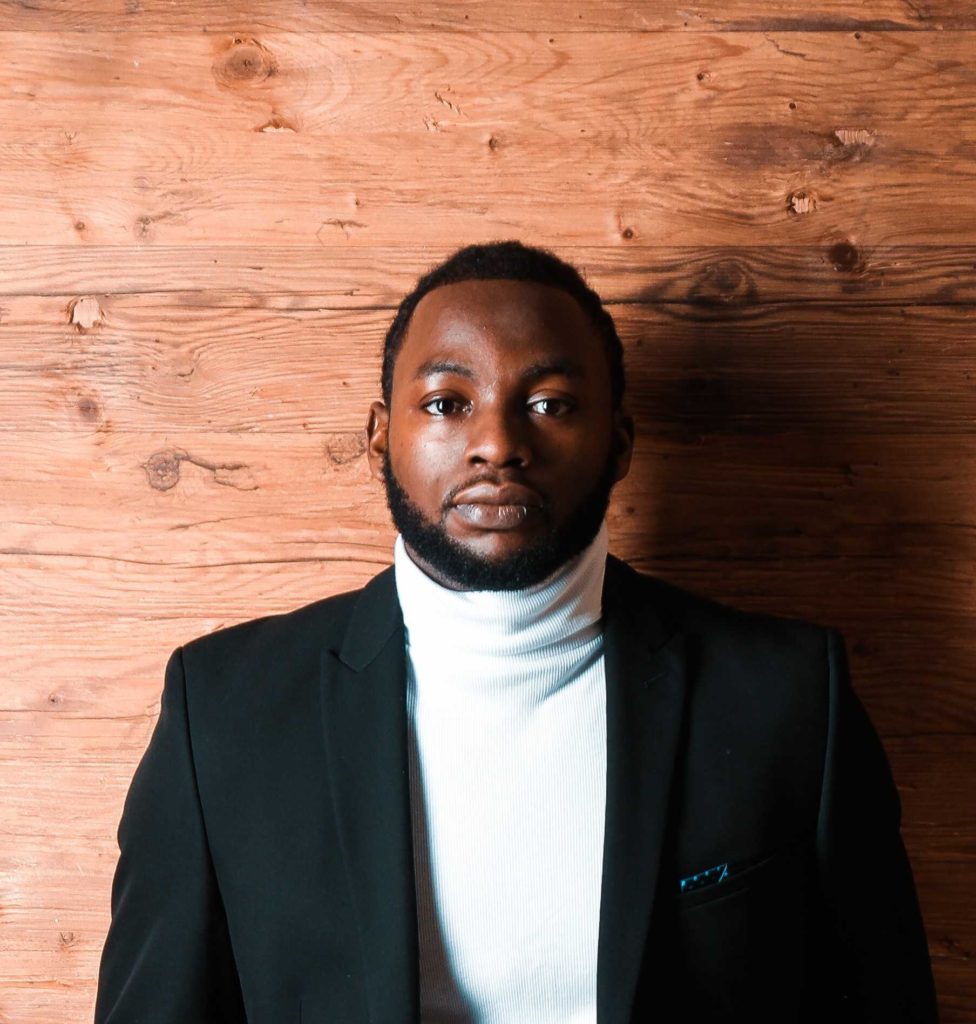
Hans: Es gibt eine Organisation, da ist kein weißer Deutscher der Gründer sondern es ist eine Organisation, die sich mit Projekten in Afrika beschäftigt und die Initiatoren sind selbst AfrikanerInnen. Samuel, erzähl doch mal die Entstehungsgeschichte.
Contimi: Du hast ja schon selbst gesagt, du kennst hauptsächlich NGOs mit überwiegend weißen Europäern. Es geht nicht in erster Linie darum, dass es um NGOs geht die aus weißen Mitgliedern besteht oder nicht. Es geht eher darum ob die Mitglieder der NGO mit der Zielgruppe übereinstimmt. Ich kann meine Zielgruppe nur dann gut verstehen, wenn ich mich auf gewisser Weise mit dieser Zielgruppe identifiziere. Das sollte meiner Meinung nach eine Grundvoraussetzung sein. Normalerweise sieht man genau diese Abbildung, wenn man in den wirtschaftlichen Bereich geht. Wir sind bei uns im Verein zu knapp 61% AfrikanerInnen aus Afrika und in der Diaspora und dabei noch 50% Frauen insgesamt. Auch unser Recruiting sieht entsprechend aus; wir sprechen proaktiv Diasporamitglieder an.
Wir haben uns in Deutschland gegründet und haben Deutsche, Europäer als Mitglieder. Aber wenn du 50% Anteil an Diaspora haben willst, musst du diese Menschen gezielt ansprechen.
Hans: Wie kommt das an, wenn ihr die Menschen aus der Diaspora für den Verein ansprecht?
Contimi: Wir versuchen vor allem die Menschen zu gewinnen, die sich mit unserer Vision identifizieren können. Wenn wir dazu kommen, die Ziele und Visionen des Vereins zu erklären, sind die Menschen auch bewegt. Viele Menschen aus der afrikanischen Diaspora machen schon viel neben dem Studium, sie arbeiten und engagieren sich anderweitig. Deswegen ist es nicht so einfach, sie zu Tätigkeiten für den Verein zu überzeugen. Aber wenn wir sie als größtenteils Diasporaverein ansprechen, auch etwas für die eigene Heimat zu gestalten, dann ist es einfacher. Das kommt dann sehr gut an.
Hans: Da steckt ja schon auch viel Idealismus drin, oder? Du, ihr, möchtet ja auch einiges bewegen in den Projektländern. Dort gibt es trotz guter Ausbildung, kaum Chancen auf einen guten Job im studierten Bereich. Ist da keine Verbesserung in Sicht?
Contimi: Man kann das auf ein paar Punkte herunterbrechen. Wir sagen hier im Verein in Deutschland nicht, die Menschen müssen auf jeden Fall in ihrer Heimat in Afrika bleiben. Jeder Mensch sollte die Freiheit haben, zu reisen. Es geht mehr um das Mindset. Das ist ja auch einer der Gründe, weshalb wir den Verein gegründet habe. Als ich aus Kamerun nach Deutschland kam, hatte ich das Mindset, dass ich es in Kamerun nicht schaffen kann und, dass ich nach Europa muss, damit ich etwas aus meinem Leben machen kann. Das haben leider viel junge Menschen in Kamerun. Eine Veränderung des Mindset ist auch, dass man sein Bild von Afrika verändert. Viele junge Menschen in Afrika wachsen auf mit einem negativen Medienbild über Afrika auf. Genau das ist auch ein Erbe der kolonialen Strukturen. Diese Strukturen wirken bis heute nach. Im Land selbst gibt es aber noch viele noch nicht ausgereifte, aber vielversprechende Märkte. Wenn jedoch die jungen Leute das Land verlassen, ändert sich auch nichts an der Entwicklung. Es gibt also eine Verantwortung vor Ort und es gibt die postkolonialen Strukturen.
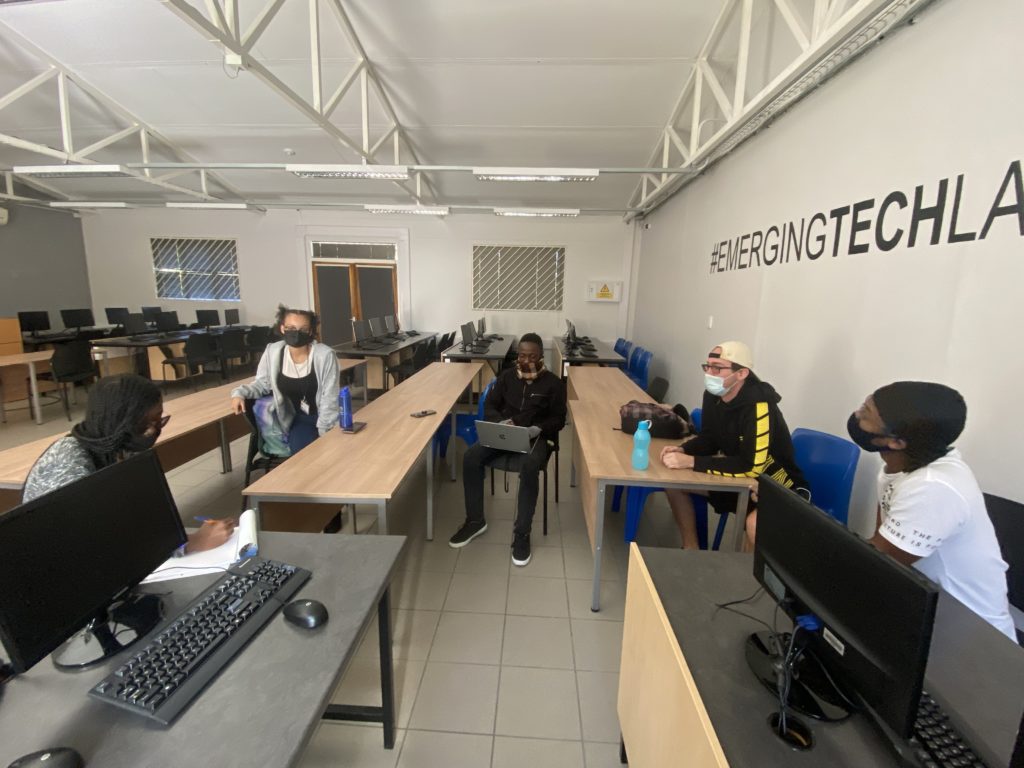
Hans: Wieso bewegt dich das, was in deiner Heimat passiert. Es gibt ja viele Menschen, die haben nicht solch einen Idealismus. Kurz gefragt: Was treibt dich an?
Contimi: Ich bin in einer afrikanischen Kultur aufgewachsen, die mich gelernt hat: Gib zurück! Gib zurück an die Community, gib zurück an deine Heimat. Ohne die eigene Heimat ist man nichts. Ich habe aber auch schon ein panafrikanisches Mindset, weil ich der Meinung bin, dass Afrika für die Welt viel mehr anzubieten hat als in der Regel öffentlich kommuniziert wird. Des Weiteren sehe mich auch als ein Produkt von Brain-Drain und so kann es nicht weitergehen. Ich habe mich, als ich nach Deutschland kam, schlau gemacht, was passiert mit meiner Heimat allgemein aber auch in Bezug auf den Klimawandel. Und habe mich entschieden für etwas, das einen größeren Impact hat. Den größten Impact, den man meiner Meinung nach haben kann, ist, dass man das Leben von Menschen gemeinsam mit denen positiv beeinflussen kann. Ich studiere ja Elektrotechnik, das ist ja meine Bindung zum Thema Erneuerbare Energien, Klimawandel und Nachhaltigkeit. Es kann aber nicht nur um Technik gehen. Es muss viel mehr verändert werden, insbesondere das Mindset.
Wir sehen uns nicht als die die Veränderungen machen, wir sehen uns als Teil einer Bewegung. Die Changemaker sind die afrikanischen Studierenden.
Hans: Aus dir spricht ja der Optimismus, deswegen kann ich mir die Frage nach dem Sinn, ob ihr was ändern könnt, ja sparen, oder?
Contimi: Ja, das stimmt, ich bin Optimist. Einerseits ist eine Veränderung absolut notwendig, andererseits habe ich andere Organisationen kennengelernt, die erkennen, wie wichtig Empowerment ist, und insofern einem ähnlichen Ansatz verfolgen, es geht also jetzt schon voran. Wichtig ist für uns jedoch: wir sehen uns nicht als die die Veränderungen machen, wir sehen uns als Teil einer Bewegung. Die Changemaker sind die afrikanischen Studierenden.
Hans: Ihr habt euch als Initiative zusammen getan. War euch von vornherein klar, wie eine Finanzierung aussehen könnte, ob es Schwierigkeiten damit geben könnte?
Contimi: Es ist zwar herausfordernd, aber wir schaffen das mit einem kleinen Team. Da ist z.B. auch viel Kommunikation nötig, wir wollen ja auch das Mindset ändern. Auch bei potentiellen Großspendern, um unser Anliegen zu erklären. Bei diesen Großspendern konkurrieren wir auch mit anderen Initiativen. Ganz oft werden wir noch nicht so wahrgenommen, wie es unserem Selbstbild entspricht. Aber wir haben einige gute Partner bekommen, wie z.B. Engagement Global. Sie haben unser allererstes Projekt unterstützt, das war schon ein großes Vertrauen. Das haben wir sehr geschätzt. Wir sind uns daher sicher, dass wir mit der Zeit organisch wachsen.

Hans: Welche der drei Es Empowerment, Ecofriendly, Education ist das wichtigste und warum? Und was ist mit dem J? Für Job?
Contimi: Du hast recht. Arbeitsplätze sind schon wichtig. Jobs sind in unseren Projekten die Stufe danach. Im Idealfall entstehen nachhaltige Start-Ups aus den Forschungsprojekten heraus. Wir wollen schon an der Wurzel zugreifen und nicht nur die Symptome bekämpfen. Es ist eine strukturelle Herausforderung, weil vor den Jobs viele Stufen der Entwicklung stehen.
Alle drei Es sind gleichwertig aber auch interdependent. Ohne Education kann man nicht Empowern. Mit Bildung werden die Changemaker empowert. Dann können die Changemaker aus eigener Kraft agieren und zwar nachhaltig. Wir haben die Notwendigkeit des dritten Es, direkt bei der Gründung gesehen. Die Auswirkungen des Klimawandels auf Afrika sind dramatisch. Ohne Rücksicht auf die Umwelt, ohne selbstständiges nachhaltiges Entwickeln, wird es in Afrika und in der Welt allgemein nicht gehen. Es muss der Energiewende-Aspekt mit einbezogen werden.
Hans: Was müsste Europa mehr machen, damit Staaten wie Kamerun eine gleichberechtigte Chance haben?
Contimi: Aktive Dekolonialisierung. Europa muss mehr daran arbeiten, postkoloniale Strukturen abzuschaffen anstatt diese aufrecht zu erhalten. Auch die Entwicklungszusammenarbeit (EZ), so wie sie jetzt ist, muss überdacht werden und das klassisch negative Afrikabild verändert werden. Man müsste beide Seiten als gleichwertige Partner (Europa und Afrika) sehen, aber das ist nicht der Fall. Außerdem werden Stereotypen und Klischees aufrechterhalten Das „Spenden für Afrika“ verstärkt einerseits das negative und abhängiges Bild von Afrika und anderseits das Superioritätskomplex vieler westlichen Nationen, die die Meinung sind, die wissen am besten, was Afrika benötigt. Aber das weiß Afrika selbst!
Mit dem größeren Bevölkerungswachstum hat Afrika auch die größte Innovationskraft. Afrika wird deswegen den größten Impact im Klimawandel haben. Es geht nicht darum, den Klimawandel zu stoppen, aber zu begrenzen, zu verlangsamen und sich daran anzupassen. Mit den Spenden in unsere Projekte wollen wir in diese Innovationskraft investieren. Das heißt bei uns wird nicht für Afrika gespendet, sondern für den Kampf gegen den Klimawandel. Der Klimawandel ist global, die Aktionen sind lokal. Wir müssen uns immer wieder auch die Dimensionen und Unterschiede im globalen Ungleichgewicht vor Augen halten.
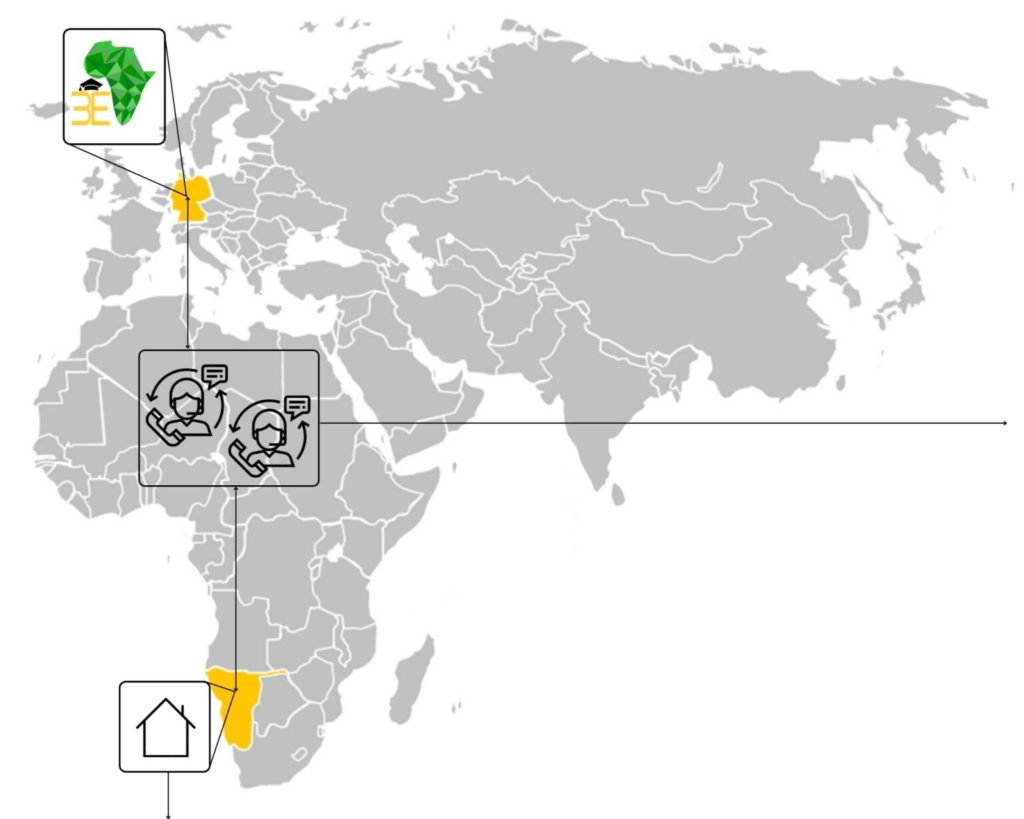
Hans: Was müsste Europa mehr machen, damit auch afrikanische Staaten eine faire ökonomische Chance haben? Was müssten afrikanische Staaten wie Kamerun mehr machen, damit die jungen Menschen dort bleiben?
Contimi: Ich denke, die aktive Dekolonialisierung ist das, was Europa machen muss, die afrikanischen Staaten haben dagegen ihre eigene Verantwortung für das, was sie tun. Ihre Rolle entscheidet, ob eine Veränderung schneller voran kommt oder auch nicht. Die müssen an ihre junge Generation glauben und diese auch fördern. Konkret heißt das: mehr Instrumente und Förderprogramme bereitstellen, die ihnen zur Förderung ihrer eigenen Entwicklung beitragen. Ich bin immer der Freund von zwei Perspektiven. Jeder und jede hat immer seine Verantwortung. Europa hat die Verantwortung für das was gemacht wurde in der Vergangenheit. Aber die afrikanischen Staaten haben auch ihre eigene Verantwortung ihrem Volk gegenüber. Letztendlich geht’s um ihr eigenes Zuhause und sie haben die Hauptverantwortung dafür zu sorgen, dass es denen gut geht!
Hans: In Afrika agieren viele größere Player, die sehr unterschiedliche Interessen haben: Die Weltbank, World Food Programme, Staaten und Staatenorganisationen mit Ländern aus Europa, Amerika und Asien. Wie verhält sich die Arbeit von 3e4africa zu diesen Organisationen, ist das manchmal frustrierend?
Contimi: Natürlich beeinflussen diese Player das Geschehen. Aber dadurch, dass es große Player sind, haben sie eigentlich immer einen Top Down Ansatz. Sie gehen hierarchisch vom Größten runter in die Community Ebene. Wir haben uns für das Gegenteil entschieden: Bottom Up. Also fangen wir auf der Comunity Ebene an, das entspricht auch unserer Idee vom Empowerment.
Unsere Programme richten sich also direkt an die afrikanischen Studierenden in den Communities. Die sollten als Changemaker agieren. Sie entscheiden auch mit, wer sie betreuen wird. Sie behalten den Schlüssel in der Hand, sie entscheiden auch, wohin es geht.
Hans: Es gibt drei Länder in Afrika, in denen ihr Programme auflegt, Kamerun, Ghana und Namibia. Wie ist die Resonanz in den Ländern?
Contimi: Wir können die Resonanz direkt bei den Studierenden vor Ort abrufen. Und die ist positiv und motivierend. Ich war privat in Kamerun Anfang des Jahres und habe dann auch ein Seminar an der Universität von Yaoundé I gegeben. Daraus haben sich verschiedene Anfragen für Teilhabe an Projekten ergeben. Auch bei den lokalen Projektpartnern ist die Resonanz positiv. Sie waren begeistert, an coolen Ideen mitwirken zu können. Das pusht auch uns in unserer Motivation.
Hans: Ich kann mir vorstellen, das das ein komplett anderer Auftritt ist, wenn du dort als Diaspora-Kameruner hinkommst und deine Sache vertrittst. Keine weißen Jeeps mit weißen NGOs, die Prospekte verteilen…
Contimi: Es kommen auch ganz andere Fragen. Ich bin Kameruner und werde auch so wahrgenommen. Beim Austausch mit Studierenden sind wir auch einfach kamerunische Studierende, egal ob ich in Deutschland bin oder dort. Das Aufbauen des Vertrauens und die Zusammenarbeit ist eine ganz andere. Das ist das was ich meine, wenn ich sage, wir begegnen uns auf Augenhöhe.
Afrika kann vieles alleine auf die Beine stellen. Aber das schafft man nur, wenn man auf die junge Generation setzt.
Hans: Deutschland hat, wie alle anderen Kolonialmächte auch, die Regionen in Afrika geprägt, umgestaltet, ausgebeutet, deformiert. Muss sich Deutschland seiner Verantwortung gegenüber den ehemaligen Kolonien viel stärker stellen?
Contimi: Deutschland hat wie alle ehemaligen Kolonialmächte die Verantwortung für das, was sie in der Vergangenheit getan haben. Das ist auch keine Frage mehr, die man sich stellen muss, das ist eigentlich selbstverständlich. Jeder und Jede, muss mit den Konsequenzen der eigenen Aktionen leben und umgehen. Aber es muss sicher gestellt sein, dass die Staaten Afrikas ihre Entwicklung selbst bestimmen. Genau das wollen wir mit unseren 3Es verbreiten: Afrika kann vieles alleine auf die Beine stellen. Aber das schafft man nur, wenn man auf die junge Generation setzt.
Die Forschungsprojekte, die wir finanzieren, sind initiiert von afrikanischen Studierenden und betreut von AfrikanerInnen. Der Impact ist aber im Kontext des Kampfs gegen den Klimawandel direkt lokal und indirekt und langfristig global.
Aber um es nochmal deutlich zu machen: Deutschland hat nicht die Verantwortung, Kamerun zu entwickeln. Sie haben die Verantwortung für das was sie in der Vergangenheit getan haben, Kamerun hat die Verantwortung sich selbst zu entwickeln.
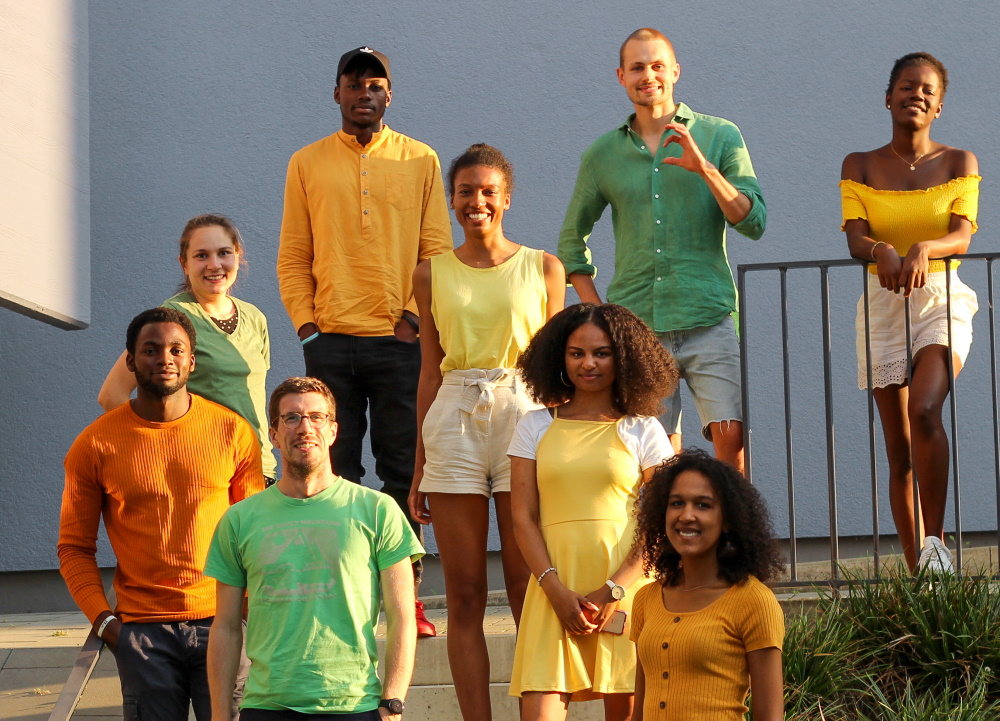
Hans: Seid ihr zufrieden mit dem Stand eures Vereins, mit dessen Größe? Größeres Wachstum wäre ja auch eine Anforderung, größerer Strukturen und mehr Menschen, die sich engagieren.
Contimi: Unsere Ansatz, so wie wir unsere Arbeit machen, ist ja noch nicht weit verbreitet. Deshalb wollen wir schon noch weiter wachsen. Es ist mir schon klar, dass wir dann mehr Mitglieder brauchen und mehr Zugang zu Finanzierungen. Beim Recruiting gibt es schon die Herausforderung, dass wir Leute brauchen, die sich tatsächlich mit unseren Visionen identifizieren. Das geht meiner Meinung nach nur mit organischem Wachstum. Wir wollen mehr mit Stiftungen zusammen arbeiten, die das mit tragen. Für 2022 planen wir zwei neue Projekte jeweils in Kamerun und Ghana, für 2023 wollen wir Zugang zu einem vierten afrikanischen Land bekommen. Langfristig wollen wir viel mehr Länder auf dem Kontinent erreichen.
Hans: Die Projekte, die ihr macht, sind alle aus dem technisch-ökologischen Bereich. Sind kulturelle Projekte in eurem Verein ausgeschlossen?
Contimi: Wir setzen auf die afrikanische Innovation für einen globalen Impact in den Kampf gegen Klimawandel. Innovation wird meistens als Technik angesehen, muss aber nicht sein. Das Projekt in Namibia hat beispielsweise kaum was mit Technik zu tun. Die Mehrheit der Projekte werden vielleicht technisch sein, aber zur Innovation gehört noch viel mehr. Kooperationen in andere Bereich wie der Filmindustrie kann es geben. Weil gerade über die Medien/Film-Industrie könnte man das Bild von Afrika noch besser darstellen.
Hans: Es gibt interessantes zu eurer Vereinsstruktur zu sagen. So habt ihr eine Quote für Frauen festgelegt?
Contimi: Momentan haben wir 56% Frauenanteil, worauf wir sehr stolz sind. Und per Satzung haben wir festgelegt, dass es mindestens 50% Frauenanteil im Vorstand sein muss. In den Projektgruppen, die immer aus 4 bis 6 Studierenden bestehen, versuchen wir die Quote von mindestens 2 Frauen zu halten. In der Umsetzung ist das aber gar nicht so einfach. Namibia ist sehr fortschrittlich, was die Gleichberechtigung der Frau an geht, sie stehen an der Weltspitze des Gender Gap Index. Da ist das Einhalten einer Quote kein Problem. In Kamerun ist es schwieriger. Es gehört aber zu unserer Idee des Empowerment, das können wir nicht ignorieren.
Hans: Was kann man tun, um euch zu unterstützen? Lebt ihr hauptsächlich von Einzelspenden?
Contimi: Die ersten Projekte wurden über Fundraising durch private Netzwerke finanziert. Unsere Projekte haben ein Budget von mindestens 10.000 €. Wir fördern damit nicht nur die Projekte mit ihren Materialkosten. Es steckt immer auch noch ein Stipendium mit drin. Da sind wir meistens eh auf Großspenden und Spenden von Unternehmen angewiesen. Aber wir freuen uns auch über private Spenden. Die Spenden müssen aber den Hintergrund haben, dass sie die Ideen des Vereins unterstützen, sprich keine „Spende für Afrika“ sondern „Spende für den Kampf gegen den Klimawandel“. Das Empowerment, und dass wir an der Afrikanischen Innovation setzten beschreibt nur das Mittel bzw. unser Ansatz bei dem Kampf gegen den Klimawandel. Großspenden, die uns in eine andere Richtung lenken wollen, bringen uns nichts. Man kann uns auch als Fördermitglied oder ehrenamtliches Mitglied unterstützen.
Hans: Contimi, vielen Dank für dieses Gespräch.
ENGLISH VERSION
Education-Empowerment-Ecofriendliness, these are the three Es that are supposed to give countries in Africa better perspectives. A non-profit association from Aachen in Germany wants to offer these perspectives. What is special is not that the association comes from Germany. What is special is that it is mainly African students living in Germany who launched and run this project in 2020. Full of enthusiasm and with a lot of commitment, they want to close a gap in the European development field with Africa that did not exist before: Cooperation at eye level, equality and fairness. Students and doctoral candidates in Cameroon, Ghana and Namibia are involved in these projects. The founding member of the association and chairman of the board is the Cameroonian-born Contimi Kenfack Mouafo. The interview was conducted by Hans Hofele for cultureafrica.
Link to the website of 3Es4Africa: https://3e4africa.org/

Hans: There is an organisation where the founder is not a white German but an organisation that deals with projects in Africa and the initiators are Africans themselves. Samuel, why don’t you tell us the story of how it came about?
Contimi: You said yourself that you know mainly NGOs with predominantly white Europeans. It’s not primarily about the fact that it’s about NGOs that consist of white members or not. It’s more about whether the members of the NGO match the target group. I can only understand my target group well if I identify with that target group in some way. In my opinion, that should be a basic requirement. Normally, you see exactly this mapping when you go into the economic field. In our association, we are almost 61% Africans from Africa and in the Diaspora, and still 50% women overall. Our recruiting also looks accordingly; we proactively approach diaspora members.
We were founded in Germany and have Germans, Europeans as members. But if you want to have 50% diaspora, you have to target these people.
Hans: How do you approach people from the diaspora for the association?
Contimi: We mainly try to attract people who can identify with our vision. When we come to explain the goals and visions of the association, people are also moved. Many people from the African diaspora already do a lot besides their studies, they work and are involved in other activities. That is why it is not so easy to convince them to do activities for the association. But if we appeal to them, as a largely diaspora association, to also do something for their own homeland, then it is easier. That goes down very well.
Hans: There is a lot of idealism involved, isn’t there? You want to make a difference in the project countries. Despite a good education, there are hardly any chances for a good job in the field of studies. Is there no improvement in sight?
Contimi: You can break it down to a few points. Here in Germany, we don’t say that people have to stay in their home countries in Africa. Everyone should have the freedom to travel. It’s more about the mindset. That is also one of the reasons why we founded the association. When I came to Germany from Cameroon, I had the mindset that I couldn’t make it in Cameroon and that I had to go to Europe so that I could make something of my life. Unfortunately, many young people in Cameroon have that mindset. A change of mindset is also to change one’s image of Africa. Many young people in Africa grow up with a negative media image of Africa. This is also a legacy of colonial structures. These structures still have an effect today. In the country itself, however, there are still many markets that are not yet mature, but which are promising. However, when the young people leave the country, nothing changes in terms of development. So there is responsibility on the ground and there are the post-colonial structures.

Hans: Why are you moved by what is happening in your home country? There are many people who don’t have such idealism. In short, what drives you?
Contimi: I grew up in an African culture that taught me: Give back! Give back to the community, give back to your homeland. Without your homeland you are nothing. But I also already have a pan-African mindset, because I believe that Africa has much more to offer the world than is usually publicly communicated. Furthermore, I also see myself as a product of brain drain and things cannot go on like this. When I came to Germany, I did some research on what was happening to my home country in general, but also in relation to climate change. And I decided to do something that has a greater impact. In my opinion, the biggest impact you can have is that you can positively influence people’s lives together with them. I study electrical engineering, which is my connection to renewable energies, climate change and sustainability. But it can’t just be about technology. Much more needs to be changed, especially the mindset.
The changemakers are the African students.
Hans: Your optimism speaks for itself, so I don’t have to ask whether you can change anything, do I?
Contimi: Yes, that’s right, I am an optimist. On the one hand, change is absolutely necessary, on the other hand, I have met other organisations that realise how important empowerment is and therefore follow a similar approach, so things are already moving forward. But what is important for us is that we don’t see ourselves as the changemakers, we see ourselves as part of a movement. The changemakers are the African students.
Hans: You came together as an initiative. Were you aware from the beginning how funding might look like, whether there might be difficulties with it?
Contimi: It is challenging, but we manage it with a small team. For example, a lot of communication is necessary, we also want to change the mindset. Also with potential major donors, to explain our cause. With these major donors, we are also competing with other initiatives. Quite often we are not yet perceived in the way that corresponds to our self-image. But we have got some good partners, like Engagement Global. They supported our very first project, which was already a great trust. We appreciated that very much. So we are sure that we will grow organically over time.
Hans: Which of the three Es Empowerment, Ecofriendly, Education is the most important and why? And what about the J? For Job?
Contimi: You are right. Jobs are already important. Jobs are the next step in our projects. Ideally, sustainable start-ups emerge from the research projects. We want to attack the roots and not just the symptoms. It is a structural challenge because there are many stages of development before the jobs.
All three Es are equally important but also interdependent. Without education, you cannot empower. With education, the changemakers are empowered. Then the changemakers can act on their own and in a sustainable way. We saw the need for the third Es right at the start. The impact of climate change on Africa is dramatic. Without consideration for the environment, without independent sustainable development, it will not work in Africa and in the world in general. The energy transition aspect must be included.

Hans: What more would Europe have to do for countries like Cameroon to have an equal chance?
Contimi: Active decolonisation. Europe needs to work more on abolishing post-colonial structures instead of maintaining them. Development cooperation (DC), as it is now, also needs to be rethought and the classically negative image of Africa needs to be changed. Both sides should be seen as equal partners (Europe and Africa), but this is not the case. Moreover, stereotypes and clichés are perpetuated. “Giving to Africa” on the one hand reinforces the negative and dependent image of Africa and on the other hand the superiority complex of many Western nations who think they know best what Africa needs. But Africa knows that itself!
With the greater population growth, Africa also has the greatest innovative power. Africa will therefore have the greatest impact on climate change. It is not a matter of stopping climate change, but of limiting, slowing down and adapting to it. With the donations to our projects, we want to invest in this innovative power. This means that we don’t donate to Africa, but to the fight against climate change. Climate change is global, actions are local. We must always keep in mind the dimensions and differences in the global imbalance.
Hans: What more would Europe have to do so that African states also have a fair economic chance? What should African countries like Cameroon do more to ensure that young people stay there?
Contimi: I think active decolonisation is what Europe has to do, whereas the African states have their own responsibility for what they do. Their role decides whether a change will move faster or not. They must believe in their young generation and also support them. In concrete terms, this means providing more instruments and support programmes that help them to promote their own development. I am always a friend of two perspectives. Each and everyone always has their responsibility. Europe has the responsibility for what was done in the past. But African countries also have their own responsibility towards their people. At the end of the day, it’s about their own homes and they have the main responsibility to make sure that they are well off!

Hans: There are many bigger players operating in Africa that have very different interests: The World Bank, World Food Programme, states and state organisations with countries from Europe, America and Asia. How does the work of 3e4africa relate to these organisations, is it sometimes frustrating?
Contimi: Of course these players influence what happens. But because they are big players, they actually always have a top down approach. They go hierarchically from the biggest down to the community level. We have chosen the opposite: Bottom Up. So we start at the community level, which also corresponds to our idea of empowerment.
So our programmes are aimed directly at the African students in the communities. They should act as changemakers. They also help decide who will supervise them. They hold the key, they also decide where it goes.
Hans: There are three countries in Africa where you have programmes, Cameroon, Ghana and Namibia. What is the response like in these countries?
Contimi: We can check the response directly with the students on site. And it is positive and motivating. I was in Cameroon privately at the beginning of the year and then also gave a seminar at the University of Yaoundé I. This resulted in various requests for parts of the programme. This resulted in various requests for participation in projects. The response from the local project partners has also been positive. They were excited to be able to participate in cool ideas. That also pushes us in our motivation.
Hans: I can imagine that it is a completely different appearance when you go there as a diaspora Cameroonian and represent your cause. No white jeeps with white NGOs handing out leaflets…
Contimi: There are also completely different questions. I am Cameroonian and I am perceived as such. In exchanges with students, we are also simply Cameroonian students, whether I am in Germany or there. Building trust and working together is quite different. That’s what I mean when I say we meet as equals.
Africa can do a lot on its own. But it can only do so by relying on the young generation.
Hans: Germany, like all other colonial powers, has shaped, reshaped, exploited, deformed the regions in Africa. Does Germany have to face up to its responsibility towards the former colonies much more?
Contimi: Germany, like all former colonial powers, has a responsibility for what they did in the past. This is no longer a question that has to be asked, it is actually self-evident. Everyone has to live with and deal with the consequences of their own actions. But it must be ensured that the states of Africa determine their own development. This is exactly what we want to spread with our 3Es: Africa can do a lot on its own. But it can only do so by relying on the young generation.
The research projects we finance are initiated by African students and supervised by Africans. But in the context of the fight against climate change, the impact is directly local and indirectly and in the long term global.
But to make it clear again: Germany does not have the responsibility to develop Cameroon. They have the responsibility for what they have done in the past, Cameroon has the responsibility to develop itself.

Hans: Are you satisfied with the state of your association, with its size? Bigger growth would also be a requirement, bigger structures and more people getting involved.
Contimi: Our approach, the way we do our work, is not yet widespread. That’s why we want to grow even more. It is clear to me that we will then need more members and more access to funding. When it comes to recruiting, there is the challenge that we need people who actually identify with our visions. In my opinion, this can only be achieved through organic growth. We want to work more with foundations that support this. For 2022, we are planning two new projects each in Cameroon and Ghana, and for 2023 we want to get access to a fourth African country. In the long term, we want to reach many more countries on the continent.
Hans: The projects you do are all in the technical-ecological field. Are cultural projects excluded in your association?
Contimi: We focus on African innovation for a global impact in the fight against climate change. Innovation is mostly seen as technology, but it doesn’t have to be. The project in Namibia, for example, has hardly anything to do with technology. The majority of projects may be technical, but there is much more to innovation. There can be cooperation in other areas such as the film industry. Because it is precisely through the media/film industry that one could present the image of Africa even better.
Hans: There are interesting things to say about the structure of your association. Have you set a quota for women?
Contimi: At the moment we have 56% women, which we are very proud of. And we have stipulated in our statutes that there must be at least 50% women on the board. In the project groups, which always consist of 4 to 6 students, we try to maintain the quota of at least 2 women. However, this is not so easy to implement. Namibia is very progressive when it comes to equal rights for women; they are at the top of the world in the Gender Gap Index. Adhering to a quota is not a problem. In Cameroon it is more difficult. But it is part of our idea of empowerment, we cannot ignore that.
Hans: What can people do to support you? Do you live mainly from individual donations?
Contimi: The first projects were financed by fundraising through private networks. Our projects have a budget of at least 10,000 €. We do not only support the projects with their material costs. There is always a scholarship involved as well. We are mostly dependent on large donations and donations from companies anyway. But we are also happy about private donations. But the donations must have the background that they support the ideas of the association, i.e. not a “donation for Africa” but a “donation for the fight against climate change”. Empowerment, and the fact that we are working on African innovation, only describes the means or our approach in the fight against climate change. Large donations that try to steer us in a different direction do not help us. You can also support us as a sustaining or voluntary member.
Hans: Contimi, thank you very much for this interview.
Copyright: cultureafrica.net 2022


